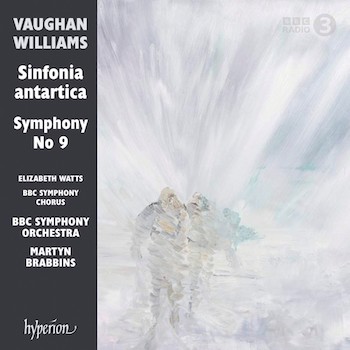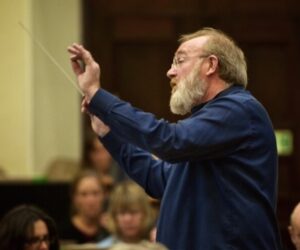Classical Music Album Review: Martyn Brabbins conducts Vaughan Williams
By Jonathan Blumhofer
This BBC Symphony Orchestra series, dedicated to Ralph Vaughan Williams’s nine symphonies, comes to a triumphant end with this disc.
 Martyn Brabbins’s years-long survey of Ralph Vaughan Williams’s nine symphonies with the BBC Symphony Orchestra (BBCSO) has been reliably pleasing and well recorded. It has also veered off from time to time and offered some surprising filler: songs, choral works, music from Paul Bunyan. There’s none of the last in this final installment, though, which brings the series to a triumphant end with the Sinfonia antartica (No. 7) and the Symphony No. 9.
Martyn Brabbins’s years-long survey of Ralph Vaughan Williams’s nine symphonies with the BBC Symphony Orchestra (BBCSO) has been reliably pleasing and well recorded. It has also veered off from time to time and offered some surprising filler: songs, choral works, music from Paul Bunyan. There’s none of the last in this final installment, though, which brings the series to a triumphant end with the Sinfonia antartica (No. 7) and the Symphony No. 9.
The former is famously drawn from Vaughan Williams’s music for the film, Scott of the Antarctic. As such, it’s about as direct and accessible a symphony as he wrote, which explains both its popularity and the simmering (also pointless) debate about whether the piece is actually a symphony or a suite of film music. It’s both.
Brabbins and his forces don’t shy away from the cinematic elements of the score here: the wind machine in the outer movements conjures plenty of atmosphere, and the wordless vocal parts are delivered hauntingly by soprano Elizabeth Watts and the BBC Symphony Chorus.
The BBCSO’s overarching performance is one of admirable sonic presence and tonal richness. The big outer movements are smartly paced and lucidly balanced: the percussion writing in the Prelude speaks conspicuously well, while the finale unfolds with impellent rhythmic clarity.
In between come moments of blazing intensity — the Scherzo’s climaxes are harrowing and the organ entrance at the apex of “Landscape” is full blooded and thrilling — and delicate introspection. The second movement’s unison passagework, for instance, is downright chilling, while the Intermezzo’s phrasings are lean and soulful.

Conductor Martyn Brabbins. Photo: Hyperion
Much the same sort of attention to detail is also lavished on the Ninth Symphony, which was premiered just a few months before Vaughan Williams’s death in 1958. In this performance, Brabbins’s tempos are sometimes a touch broad, though there’s nothing stodgy about the BBCSO’s playing.
Rather, beauty and warmth of tone, and underlining the music’s lyrical impulses seem to be the name of the game. The outer movements are especially mellifluous, even as the first’s central section is plenty muscular and the BBCSO brasses shine mightily at the end of the finale.
If one might prefer a bit more edge to the proceedings in the Andante and Scherzo, Brabbins’s approach doesn’t stint on color. Textures in the middle of the former are commendably precise, while the swirling saxophone figurations in the latter don’t disappoint.
Jonathan Blumhofer is a composer and violist who has been active in the greater Boston area since 2004. His music has received numerous awards and been performed by various ensembles, including the American Composers Orchestra, Kiev Philharmonic, Camerata Chicago, Xanthos Ensemble, and Juventas New Music Group. Since receiving his doctorate from Boston University in 2010, Jon has taught at Clark University, Worcester Polytechnic Institute, and online for the University of Phoenix, in addition to writing music criticism for the Worcester Telegram & Gazette.
Tagged: BBC Symphony Orchestra, Elizabeth Watts, Hyperion, Martyn Brabbins, Ralph Vaughan Wiliams, Ralph Vaughan Williams
